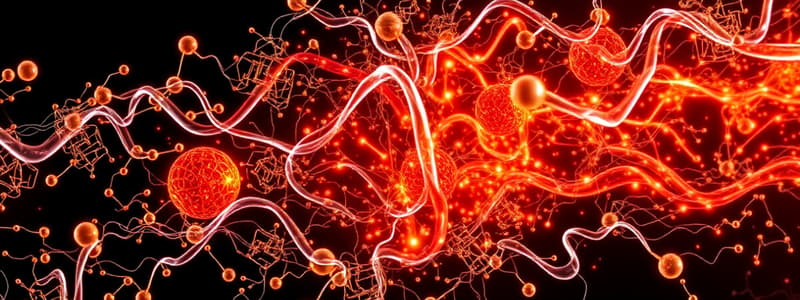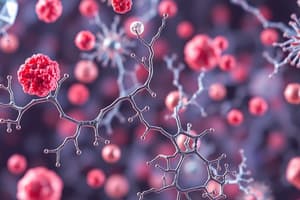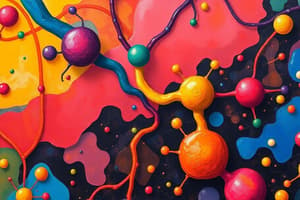Podcast
Questions and Answers
What is the primary role of metabolism in living organisms?
What is the primary role of metabolism in living organisms?
- Initiating rapid defense mechanisms.
- Facilitating immediate muscle contractions.
- Maintaining the living state of cells and organisms. (correct)
- Regulating body temperature exclusively.
Which of the following best describes a metabolic pathway?
Which of the following best describes a metabolic pathway?
- A process where molecules are broken down into identical replicas.
- The spontaneous formation of complex molecules directly from sunlight.
- A fixed, irreversible chemical reaction.
- A series of steps transforming basic chemicals into different chemicals through enzymes. (correct)
In human physiology, which process is characterized by reactions that break substances down?
In human physiology, which process is characterized by reactions that break substances down?
- Catabolism (correct)
- Mitosis
- Anabolism
- Homeostasis
Which of the following is a key characteristic of anabolic processes?
Which of the following is a key characteristic of anabolic processes?
How does catabolism primarily affect cellular energy?
How does catabolism primarily affect cellular energy?
What role does anabolism play in the growth and maintenance of body tissues?
What role does anabolism play in the growth and maintenance of body tissues?
Which of the following metabolic processes is most active during periods of rest or sleep?
Which of the following metabolic processes is most active during periods of rest or sleep?
During physical activities, which metabolic process is predominantly functional?
During physical activities, which metabolic process is predominantly functional?
Which process is responsible for the increase in muscle mass after a strength training program?
Which process is responsible for the increase in muscle mass after a strength training program?
What is the relationship between nutrition and metabolism?
What is the relationship between nutrition and metabolism?
Why is nutrition considered 'the key' to metabolism?
Why is nutrition considered 'the key' to metabolism?
Which of the following best describes the role of nutrition in producing new proteins and nucleic acids?
Which of the following best describes the role of nutrition in producing new proteins and nucleic acids?
What role do carbohydrates, lipids, and proteins play in metabolic processes?
What role do carbohydrates, lipids, and proteins play in metabolic processes?
Which metabolic fuel is typically the major source of energy for most body tissues?
Which metabolic fuel is typically the major source of energy for most body tissues?
In what form do carbohydrates primarily contribute to metabolism?
In what form do carbohydrates primarily contribute to metabolism?
What is the function of proteins in the context of metabolic activity?
What is the function of proteins in the context of metabolic activity?
How do fats contribute to metabolism beyond being a reserve storage for energy?
How do fats contribute to metabolism beyond being a reserve storage for energy?
What is a significant role of minerals in metabolic pathways?
What is a significant role of minerals in metabolic pathways?
What distinguishes vitamins from other organic compounds in metabolism?
What distinguishes vitamins from other organic compounds in metabolism?
Which of the following hormones is responsible for anabolic processes such as muscle growth?
Which of the following hormones is responsible for anabolic processes such as muscle growth?
What type of energy conversion occurs during anabolism?
What type of energy conversion occurs during anabolism?
Which property best describes the energy conversion within catabolism?
Which property best describes the energy conversion within catabolism?
How is oxygen utilized in catabolic versus anabolic processes?
How is oxygen utilized in catabolic versus anabolic processes?
How do catabolism and anabolism affect the efficiency of metabolic function relative to the intake of sugars?
How do catabolism and anabolism affect the efficiency of metabolic function relative to the intake of sugars?
In what capacity are fats used by the human body?
In what capacity are fats used by the human body?
How does oxygen usage differ between catabolism and anabolism in the production of metabolic energy?
How does oxygen usage differ between catabolism and anabolism in the production of metabolic energy?
Which factor accounts for the increase in mass in human anabolism?
Which factor accounts for the increase in mass in human anabolism?
How does oxygen intake relate to the processes of catabolism and anabolism?
How does oxygen intake relate to the processes of catabolism and anabolism?
Which process represents a catabolic action involved in normal human metabolic activity?
Which process represents a catabolic action involved in normal human metabolic activity?
How does the effectiveness of catabolism and anabolism affect fat?
How does the effectiveness of catabolism and anabolism affect fat?
Minerals assist the body, but what is the source of support?
Minerals assist the body, but what is the source of support?
What is the effect of vitamin deficiencies on the body?
What is the effect of vitamin deficiencies on the body?
Beyond caloric burning functionality, what role do vitamins play?
Beyond caloric burning functionality, what role do vitamins play?
What is the role of minerals in the metabolic chain within the body?
What is the role of minerals in the metabolic chain within the body?
Where are fats involved within the metabolic processes?
Where are fats involved within the metabolic processes?
Which of the below represents the effect of improved nutrition into the body?
Which of the below represents the effect of improved nutrition into the body?
Flashcards
What is Metabolism?
What is Metabolism?
The chemical process that maintains the living state of cells and organisms.
What are Bioenergetics?
What are Bioenergetics?
Biochemical or metabolic pathways through which cells obtain energy.
What are Metabolic Pathways?
What are Metabolic Pathways?
Series of steps to change basic chemicals from nutrition into other chemicals using enzymes.
What is Energy?
What is Energy?
Signup and view all the flashcards
Metabolism: Breaking Down?
Metabolism: Breaking Down?
Signup and view all the flashcards
Metabolism: Building Up?
Metabolism: Building Up?
Signup and view all the flashcards
Metabolism: Chemically Modifying?
Metabolism: Chemically Modifying?
Signup and view all the flashcards
What is Catabolism?
What is Catabolism?
Signup and view all the flashcards
What is Anabolism?
What is Anabolism?
Signup and view all the flashcards
Catabolism Aspects?
Catabolism Aspects?
Signup and view all the flashcards
Anabolism Aspects?
Anabolism Aspects?
Signup and view all the flashcards
Catabolism Supports?
Catabolism Supports?
Signup and view all the flashcards
Anabolism Supports?
Anabolism Supports?
Signup and view all the flashcards
Catabolism Involves?
Catabolism Involves?
Signup and view all the flashcards
Anabolism Involves?
Anabolism Involves?
Signup and view all the flashcards
Hormones for Anabolism?
Hormones for Anabolism?
Signup and view all the flashcards
Hormones for Catabolism?
Hormones for Catabolism?
Signup and view all the flashcards
Oxygen and Anabolism?
Oxygen and Anabolism?
Signup and view all the flashcards
Oxygen and Catabolism?
Oxygen and Catabolism?
Signup and view all the flashcards
Anabolism Conversion?
Anabolism Conversion?
Signup and view all the flashcards
Catabolism Conversion?
Catabolism Conversion?
Signup and view all the flashcards
Catabolism when Functional?
Catabolism when Functional?
Signup and view all the flashcards
Effects of Catabolism
Effects of Catabolism
Signup and view all the flashcards
What is Nutrition Role?
What is Nutrition Role?
Signup and view all the flashcards
Energy in Body
Energy in Body
Signup and view all the flashcards
What are Metabolic Fuels?
What are Metabolic Fuels?
Signup and view all the flashcards
Forms of Carbohydrates
Forms of Carbohydrates
Signup and view all the flashcards
Role Proteins
Role Proteins
Signup and view all the flashcards
Amino Proteins
Amino Proteins
Signup and view all the flashcards
Cellular Facts
Cellular Facts
Signup and view all the flashcards
Minerals Role in Body?
Minerals Role in Body?
Signup and view all the flashcards
Vitamins Important?
Vitamins Important?
Signup and view all the flashcards
Study Notes
Objectives
- After the lecture, students should be able to define metabolism.
- After the lecture, students should be able to differentiate between catabolism and anabolism.
- After the lecture, students should be able to determine the relationship between nutrition, metabolism, and energy.
What is Metabolism
- Metabolism refers to the chemical reactions involved in maintaining the living state of cells and organisms.
- Bioenergetics refers to the biochemical or metabolic pathways by which the cell ultimately obtains energy.
- Metabolic pathways allow the basic chemicals from nutrition to be changed through a series of steps into another chemical by a sequence of enzymes.
- Energy is the force or power that enables the body to do its work.
- In the human body, metabolism is illustrated in reactions that break substances down, reactions that produce larger substances from smaller substances, and reactions that chemically modify substances.
Categories of Metabolism
- Catabolism involves the breakdown of molecules to obtain energy.
- Anabolism involves the synthesis of all compounds needed by the cells.
Catabolism vs Anabolism
- Catabolism is destructive metabolism, while anabolism is constructive metabolism.
- Catabolism involves energy-producing pathways, while anabolism involves energy-consuming pathways.
- Catabolism produces the energy needed for all activity in the cells.
- Anabolism supports the growth of new cells, maintenance of body tissues, and storage of energy for future use.
- Catabolism breaks down large molecules (carbohydrates and fats) to release energy.
- Anabolism changes small molecules into larger, more complex molecules of carbohydrates, protein, and fat.
Nutrition, Metabolism, and Fuel
- Nutrition is key to metabolism.
- Metabolic pathways rely on the nutrients that they break down to produce energy.
- The body requires energy from metabolism to produce new proteins and nucleic acids (DNA, RNA), among other nutrients.
- Food provides a variety of substances essential for the building, upkeep, and repair of body tissues and for efficient functioning of the body.
- Metabolic fuels include carbohydrates, lipids (mainly), proteins (to a little extent), glucose, fatty acids, and amino acids. Glucose is the major metabolic fuel for most tissues.
Carbohydrates in Metabolism
- Carbohydrates exist in forms such as starch, sugar, and cellulose (fibers).
- Fibers provide bulk in the diet.
- Starches and sugars provide energy for humans.
- CHO and sugars produce glucose through digestion or metabolism.
Proteins in Metabolism
- Protein is the main tissue builder of the body.
- Proteins aid in cell structure functions and hemoglobin formation, carrying oxygen and enzymes in executing vital reactions and numerous functions of the body.
- Proteins supply nitrogen for DNA and RNA genetic material and energy production.
- Proteins use amino acids to make more proteins.
Fats in Metabolism
- Fats help form the cellular structure.
- Fats form a protective cushion and insulation around vital organs.
- Fats help absorb fat-soluble vitamins.
- Fats provide a reserve storage for energy.
Minerals in Metabolism
- Minerals act as body regulators.
- Minerals play a role in the metabolic pathways of the body.
- There are 25 essential elements in the body.
- There are 50 elements in the body.
Vitamins in Metabolism
- Vitamins are important organic compounds that the body cannot synthesize by itself and must obtain from the diet.
- Key vitamins include Vitamin A, Vitamin B-Thiamine (B1), Riboflavin (B2), Niacin (B3), or Nicotinic acid, and Pantothenic acid (B5).
Studying That Suits You
Use AI to generate personalized quizzes and flashcards to suit your learning preferences.




